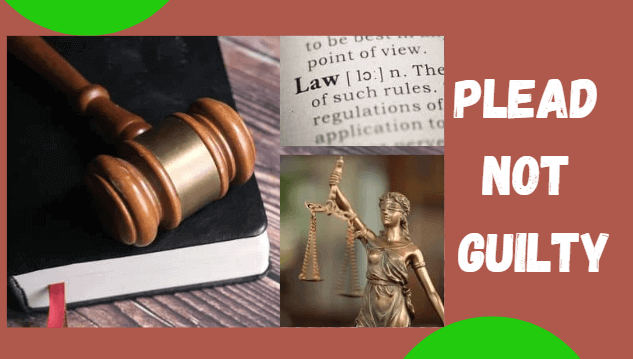Receiving a traffic ticket can be a stressful experience, but you do not have to accept the citation without question. In New Jersey, you have the right to contest a traffic violation by pleading not guilty.
This comprehensive guide will help you through the process of pleading not guilty to a traffic ticket in New Jersey, offering insights into your options, responsibilities, and the steps involved.
Contents
Understanding Your Traffic Ticket
Review the Citation: Start by carefully reading the traffic ticket you received. It will include crucial information such as the nature of the violation, the date and time of the alleged offense, and the court date. Make note of these details as they will be important for your case.
Assess the Charges: Determine what specific traffic laws you are accused of violating. Understanding the exact nature of the charges can help you formulate a defense strategy.
When You Decide to Plead Not Guilty
Deciding whether to contest a traffic violation can be a critical decision with potential implications for your driving record, insurance rates, and legal standing. Understanding when it is worth defending yourself against a traffic ticket can help you make an informed choice.

Here are key scenarios and considerations to determine when to challenge a traffic violation:
- When you believe the ticket was issued in error
- When you have evidence to support your case
- When the violation could have serious consequences
- When the violation impacts your insurance rates
- When you believe the ticket was issued unfairly
- When you Have Legal Defenses available
- When you seek to maintain a clean driving record
- When you are prepared to invest time and resources
Step-by-Step Guide to Plead Not Guilty
1. Review Your Ticket
- Verify the details on the ticket, including the date, time, location, and nature of the violation.
- Note any errors or discrepancies that could support your defense.
2. Decide to Plead Not Guilty
- Evaluate Your Case: Consider whether you have a valid defense or evidence that supports your innocence. Common defenses include errors on the ticket, faulty evidence, or challenging the legality of the traffic stop.
- Consult a Lawyer: If you’re unsure about the strength of your case or need legal advice, consult with a traffic attorney who can provide guidance and help you understand your options.
3. Submit Your Plea
- Complete the Plea Form: If applicable, fill out any required forms or documents indicating your intention to plead not guilty. These forms are often available on the municipal court’s website or at the court office.
- Choose Your Method of Submission:
- By Mail: Follow the instructions on the ticket to mail your plea.
- Online: Use the designated online portal to submit your plea.
- In Person: Visit the court listed on the ticket and submit your plea.
4. Prepare for Court
- Gather evidence and prepare your argument. Understand court procedures.
5. Attend Your Hearing
- Arrive on time, present your case clearly, and submit any supporting evidence.
6. Await the Verdict
- Listen for the court’s decision. If found guilty, comply with penalties. If not guilty, no further action is required.
7. Post-Hearing Actions
- Comply with Penalties: If you are found guilty, comply with any penalties or fines imposed by the court. Pay any required amounts promptly to avoid additional consequences.
- Consider an Appeal: If you believe the verdict was unjust, you may have the option to appeal the decision. Consult with a lawyer to explore this option and understand the process.
- Keep Records: Maintain thorough records of all correspondence, evidence, and court documents related to your case. This documentation will be useful for any future legal matters or if you need to reference your case.
By following these simplified steps, you can effectively navigate the process of pleading not guilty to a traffic violation.
Additional Tips
Stay Organized:
- Keep all documents and evidence related to your case well-organized. This will help you present a clear and coherent defense.
Be Proactive:
- Address any issues or follow-up actions promptly. Delays or inaction can result in additional fines or legal complications. Also Check – NJMCDirect
Seek Legal Assistance:
- If you encounter any difficulties or uncertainties during the process, consider seeking legal assistance. A traffic attorney can provide expert advice and representation to improve your chances of a favorable outcome.
How to Appeal a Negative Verdict
Fill Out Forms:
- Form A (Notice of Municipal Court Appeal)
- Form B (Transcript Request)
Submit Forms:
- Within 20 days after the verdict, submit Form A to the Municipal Court.
- Give the prosecutor a copy of Form A before the deadline of five days.
- Within five days, complete Form C (Certification of Timely Filing) and mail it to the Superior Court’s Criminal Division Manager.
Pay the Fee:
- Payment of a $100 fee for filing an appeal. You can ask for a waiver if you are unable to pay for it.
Some Serious Traffic Violations in New Jersey
In New Jersey, serious traffic violations can result in significant legal, financial, and personal consequences. Understanding these violations and their implications is crucial for anyone navigating the state’s traffic laws. Here’s a list of serious traffic violations in New Jersey.
- Driving Under the Influence (DUI)
- Driving While Intoxicated (DWI)
- Reckless Driving
- Driving Without a License
- Driving with a Suspended or Revoked License
- Hit and Run
- Vehicular Manslaughter
- Driving Without Insurance
Conclusion
Pleading not guilty to a traffic violation involves several key steps, from reviewing the ticket and submitting your plea to preparing for and attending your court hearing. By following this step-by-step guide, you can effectively navigate the legal process, present a strong defense, and increase your chances of a favorable resolution.